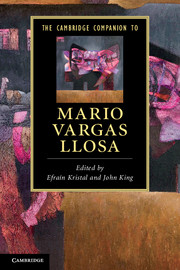Book contents
- Frontmatter
- Introduction
- 1 Reality and rebellion: An overview of Mario Vargas Llosa’s literary themes
- 2 The early novels: The Time of the Hero and The Green House
- 3 The total novel and the novella: Conversation in The Cathedral and The Cubs
- 4 Humour and irony: Captain Pantoja and the Special Service and Aunt Julia and the Scriptwriter
- 5 The historical novel: The War of the End of the World
- 6 Innocence and corruption: Who Killed Palomino Molero? and The Storyteller
- 7 The political novels: The Real Life of Alejandro Mayta and Death in the Andes
- 8 The erotic novels: In Praise of the Stepmother and The Notebooks of Don Rigoberto
- 9 The dictator novel: The Feast of the Goat
- 10 From utopia to reconciliation: The Way to Paradise, The Bad Girl and The Dream of the Celt
- 11 The essays
- 12 The memoir: A Fish in the Water
- 13 The plays
- 14 Film and the novels
- 15 An interview
- Further reading
- General index
- Index of selected fictional characters
- Index of selected works by Vargas Llosa
5 - The historical novel: The War of the End of the World
Published online by Cambridge University Press: 28 January 2012
- Frontmatter
- Introduction
- 1 Reality and rebellion: An overview of Mario Vargas Llosa’s literary themes
- 2 The early novels: The Time of the Hero and The Green House
- 3 The total novel and the novella: Conversation in The Cathedral and The Cubs
- 4 Humour and irony: Captain Pantoja and the Special Service and Aunt Julia and the Scriptwriter
- 5 The historical novel: The War of the End of the World
- 6 Innocence and corruption: Who Killed Palomino Molero? and The Storyteller
- 7 The political novels: The Real Life of Alejandro Mayta and Death in the Andes
- 8 The erotic novels: In Praise of the Stepmother and The Notebooks of Don Rigoberto
- 9 The dictator novel: The Feast of the Goat
- 10 From utopia to reconciliation: The Way to Paradise, The Bad Girl and The Dream of the Celt
- 11 The essays
- 12 The memoir: A Fish in the Water
- 13 The plays
- 14 Film and the novels
- 15 An interview
- Further reading
- General index
- Index of selected fictional characters
- Index of selected works by Vargas Llosa
Summary
A total novel
The novels published by Mario Vargas Llosa in the 1970s marked a significant turn in his writing. Unlike those of the 1960s, arguably the most complex examples of high modernist literature in the Latin American canon, the novels of the 1970s – Captain Pantoja and the Special Service (Pantaleón y las visitadoras, 1973) and Aunt Julia and the Scriptwriter (La tía Julia y el escribidor, 1977) – are characterised by their deft use of humour, their storylines filled with narrative incident and pastiche, and their overall accessibility to general readers. These novels, despite their commercial success, had raised questions among a significant minority of critics, including some of the most influential, about a possible decadence of the Peruvian novelist or a commercialisation of his literature.
The publication of The War of the End of the World (La guerra del fin del mundo) in 1981 signalled for many a return to the ambitious novelising of Vargas Llosa's first period. For instance, Peruvian critic Antonio Cornejo Polar found that ‘with The War of the End of the World, Vargas Llosa again shows his ability to propose extremely vast and complex narrative projects and to develop them with unusual efficacy and ingenuity’. The Uruguayan Angel Rama, another great Latin American literary critic of the period, was even more enthusiastic, proclaiming the novel ‘amasterpiece’, and predicting that in ‘one hundred years … it will be mentioned as one of the key novels of this second half of the twentieth century. Rama even declared Vargas Llosa to be ‘our greatest living classic [writer]’. The doubts that, at least for some, had been generated by the turn in Vargas Llosa’s writing had been answered by the publication of a work that equalled the highest achievements of his earlier period.
- Type
- Chapter
- Information
- The Cambridge Companion to Mario Vargas Llosa , pp. 62 - 73Publisher: Cambridge University PressPrint publication year: 2011



